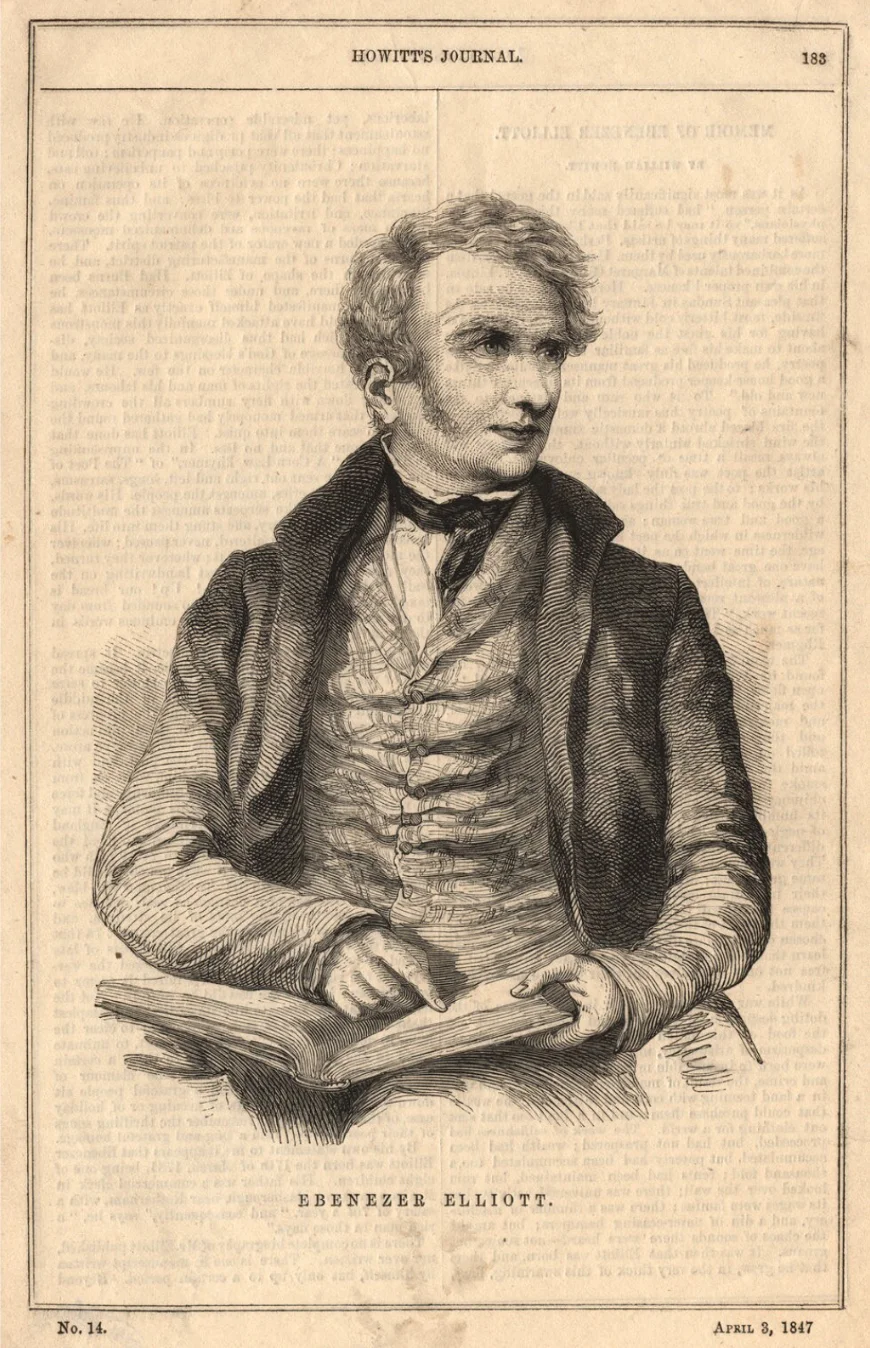ELLIOTT, EBENEZER (1781–1849)
ELLIOTT, EBENEZER (1781–1849), English poet, the corn-law rhymer,
was born at Masborough, near Rotherham, Yorkshire, on the 17th of March 1781. His father, who was an extreme Calvinist and a strong radical, was engaged in the iron trade. Young Ebenezer, although one of a large family, had a solitary and rather morbid childhood. He was sent to various schools, but was generally regarded as a dunce, and when he was sixteen years of age he entered his father’s foundry, working for seven years with no wages beyond a little pocket money. In a fragment of autobiography printed in the Athenaeum (12th of January 1850) he says that he was entirely self-taught, and attributes his poetic development to long country walks undertaken in search of wild flowers, and to a collection of books, including the works of Young, Barrow, Shenstone and Milton, bequeathed to his father by a poor clergyman. At seventeen he wrote his Vernal Walk in imitation of Thomson. His earlier volumes of poems, dealing with romantic themes, received little but unfriendly comment. The faults of Night, the earliest of these, are pointed out in a long and friendly letter (30th of January 1819) from Robert Southey to the author.
Elliott’s wife brought him some money, which was invested in his father’s share of the iron foundry. But the affairs of the firm were then in a desperate condition, and money difficulties hastened his father’s death. Elliott lost all his money, and when he was forty years old began business again in Sheffield on a small borrowed capital. He attributed his father’s pecuniary losses and his own to the operation of the corn laws. He took an active part in the Chartist agitation, but withdrew his support when the agitation for the repeal of the corn laws was removed from the Chartist programme. The fervour of his political convictions effected a change in the style and tenor of his verse. The Corn-Law Rhymes (3rd ed., 1831), inspired by a fierce hatred of injustice, are vigorous, simple and full of vivid description. In 1833–1835 he published The Splendid Village; Corn-Law Rhymes, and other Poems (3 vols.), which included The Village Patriarch (1829), The Ranter, an unsuccessful drama, Keronah, and other pieces. He contributed verses from time to time to Tait’s Magazine and to the Sheffield and Rotherham Independent. In the meantime he had been successful in business, but he remained the sturdy champion of the poor. In 1837 he again lost a great deal of money. This misfortune was also ascribed to the corn laws. He retired in 1841 with a small fortune and settled at Great Houghton, near Barnsley, where he died on the 1st of December 1849. In 1850 appeared two volumes of More Prose and Verse by the Corn-Law Rhymer. Elliott lives by his determined opposition to the bread-tax,
as he called it, and his poems on the subject are saved from the common fate of political poetry by their transparent sincerity and passionate earnestness.
An article by Thomas Carlyle in the Edinburgh Review (July 1832) is the best criticism on Elliott. Carlyle was attracted by Elliott’s homely sincerity and genuine power, though he had small opinion of his political philosophy, and lamented his lack of humour and of the sense of proportion. He thought his poetry too imitative, detecting not only the truthful severity of Crabbe, but a slight bravura dash of the fair tuneful Hemans.
His descriptions of his native county reveal close observation and a vivid perception of natural beauty.
See an obituary notice in the Gentleman’s Magazine (Feb. 1850). Two biographies were published in 1850, one by his son-in-law, John Watkins, and another by January Searle
(G. S. Phillips). A new edition of his works by his son, Edwin Elliott, appeared in 1876.
[contributor not given]
